Related Research Articles

Antonio Allegri da Correggio, usually known as just Correggio was an Italian Renaissance painter who was the foremost painter of the Parma school of the High Renaissance, who was responsible for some of the most vigorous and sensuous works of the sixteenth century. In his use of dynamic composition, illusionistic perspective and dramatic foreshortening, Correggio prefigured the Baroque art of the seventeenth century and the Rococo art of the eighteenth century. He is considered a master of chiaroscuro.
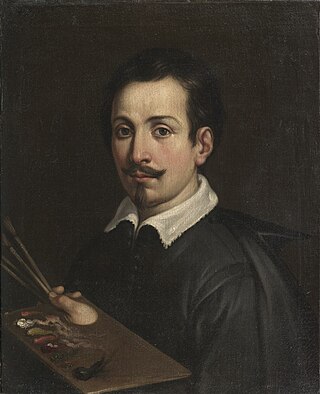
Guido Reni was an Italian painter of the Baroque period, although his works showed a classical manner, similar to Simon Vouet, Nicolas Poussin, and Philippe de Champaigne. He painted primarily religious works, but also mythological and allegorical subjects. Active in Rome, Naples, and his native Bologna, he became the dominant figure in the Bolognese School that emerged under the influence of the Carracci.

Pinturicchio, or Pintoricchio, also known as Benetto di Biagio or Sordicchio, was an Italian Renaissance painter. He acquired his nickname because of his small stature and he used it to sign some of his artworks that were created during the fifteenth and sixteenth centuries.
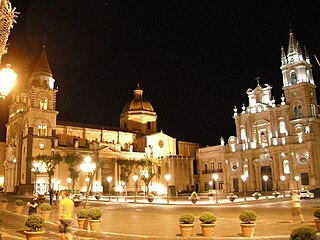
Acireale is a coastal city and comune in the north-east of the Metropolitan City of Catania, Sicily, southern Italy, at the foot of Mount Etna, on the coast facing the Ionian Sea. It is home to numerous churches, including the Neo-Gothic St. Pietro's Basilica, St. Sebastiano's Basilica in the Sicilian Baroque style, and the 17th century Acireale Cathedral, and a seminary, for the training of priests. Acireale is also noted for its art and paintings: the oldest academy in Sicily, the Accademia di scienze, lettere e belle arti degli Zelanti e dei Dafnici, is located here.

Giovanni Tuccari (1667–1743) was an Italian painter during the Baroque period, active in Sicily.
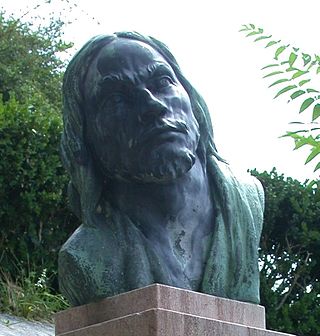
Pordenone, Il Pordenone in Italian, is the byname of Giovanni Antonio de’ Sacchis, an Italian Mannerist painter, loosely of the Venetian school. Vasari, his main biographer, wrongly identifies him as Giovanni Antonio Licinio. He painted in several cities in northern Italy "with speed, vigor, and deliberate coarseness of expression and execution—intended to shock".

Cristoforo Roncalli was an Italian mannerist painter. He was one of the three painters known as Pomarancio or Il Pomarancio.

Giacinto Brandi was an Italian painter from the Baroque era, active mainly in Rome and Naples.
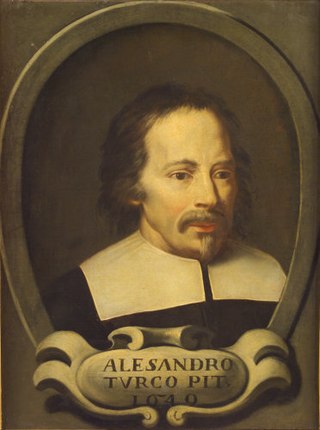
Alessandro Turchi was an Italian painter of the early Baroque, born and active mainly in Verona, and moving late in life to Rome. He also went by the name Alessandro Veronese or the nickname L'Orbetto. His style has been described as soft and Caravaggesque at the same time.
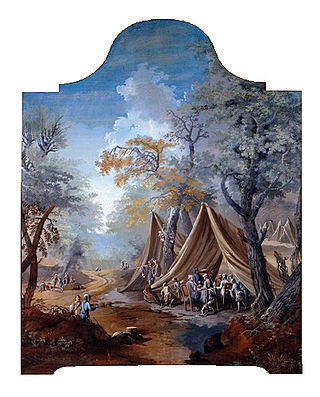
Antonio Rossi (1700–1753) was an Italian painter of the late-Baroque or Rococo period, active mainly in Bologna.

Antonio Filocamo and his brother Paolo were Italian painters of the Baroque period.
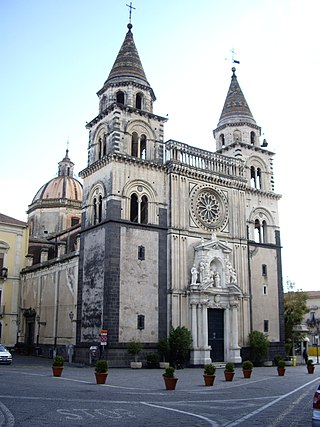
Acireale Cathedral is a Roman Catholic cathedral dedicated to the Annunciation of the Blessed Virgin Mary in the city of Acireale in Sicily, province of Catania, Italy. It was declared the seat of the Bishop of Acireale in 1870. It was declared a minor basilica in 1957.

Vito D'Anna was an Italian painter, considered the most prominent painter of Palermitan rococo and one of the most important artists of Sicily.

Antonino Bonaccorsi also called il Chiaro was an Italian painter.

Francesco Mancini-Ardizzone was an Italian painter. He painted diverse subject matter, including portraits, genre, and sacred subjects, as well as landscapes and seascapes of the Southern Italian and Sicilian coasts.
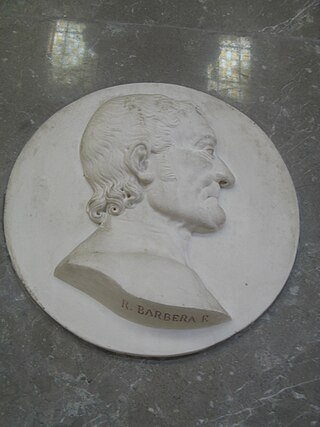
Giuseppe Velasquez, Velasques or Velasco was an Italian painter, active in a Neoclassic style.

Biagio Martini was an Italian painter, active mainly in Parma in a Neoclassical style.
San Biagio is a Neoclassic style, Roman Catholic church in the city of Lendinara, in the province of Rovigo, region of Veneto, Italy. The church facade presently faces the Adigetto River.
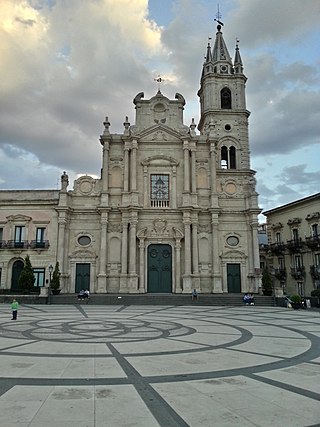
Santi Pietro e Paolo is a Baroque-style, Roman Catholic collegiate basilica church located in central Acireale in the region of Sicily of Italy. It rises adjacent to the Cathedral of Acireale.

Piero or Pietro Paolo Vasta was an Italian painter of the Baroque period, mainly active in the east of his native Sicily.
References
- ↑ Galleria Zelantea, notes on arts in Acireale.
- ↑ Biography Archived 2013-10-29 at the Wayback Machine of Platania.